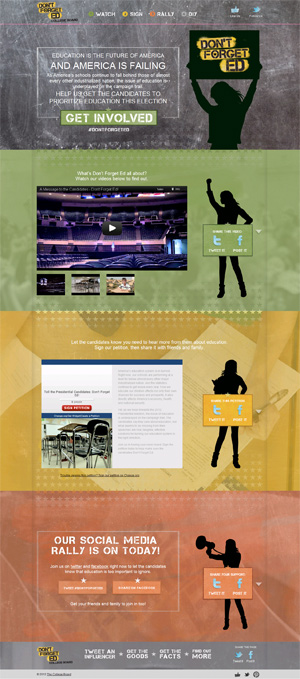NEW YORK —The College Board’s Don’t Forget Ed campaign is today bringing to life the enormous economic benefits of education reform by placing $1.5 billion in “cash” on Wall Street. The installation which is comprised of six-foot stacks of fake $100 bills, represents the amount of money that would be added to the economy each year if the high school dropout were reduced by just one percent. Don’t Forget Ed calls upon the presidential candidates to discuss and debate their plans for reform amid an alarming decline in the state of American education.
“As the presidential parties are gearing up for their national nominating conventions, we want to make sure that education is at the top of the agenda,” said College Board President Gaston Caperton. “Education is the foundation of much of our society—the economy, health care, and so much more depend on raising educated citizens. Reducing the high school dropout rate is one of many steps that we can take to shore up this foundation, but it’s not the only step. Don’t Forget Ed is a movement that encourages candidates to think about education, talk about education and show Americans that they care about education. The silence on this key issue ends now.”
As part of the day’s call to action, Don’t Forget Ed is also holding a social media rally to engage thousands of supporters via Twitter and Facebook. Supporters around the country will take to the Web to tweet (using the hashtag #DontForgetEd) and post statements about the importance of education – sending a powerful message to the candidates that will be difficult to ignore.
Don’t Forget Ed is an innovative, multi-tactical campaign that launched June 20 on the National Mall in Washington, with an installation of 857 empty school desks symbolizing the number of students who drop out of school every hour of every school day. Since its inception, the movement has gathered momentum across the nation and garnered media attention around the globe. The campaign includes a website, a petition to be presented to the candidates in the fall, a PSA featuring former New York City Schools Chancellor Joel Klein, and a dramatic video featuring 18-year-old Merone Tesfaye, a graduating senior at New York’s LaGuardia High School of Music & Art and Performing Arts.
“Don’t Forget Ed doesn’t take sides and doesn’t advocate for a particular policy or ideology,” said Peter Kauffmann, vice president of communications at the College Board. “What it does do is create awareness about a critical issue that regularly gets pushed aside during campaign season. Don’t Forget Ed is elevating the voice of voters across the country as they call on the candidates to make education a priority.”
Photos from the installation will be available upon request.
– 30 –
About the College Board:
The College Board is a mission-driven not-for-profit organization that
connects students to college success and opportunity. Founded in 1900,
the College Board was created to expand access to higher education.
Today, the membership association is made up of over 6,000 of the
world’s leading educational institutions and is dedicated to promoting
excellence and equity in education. Each year, the College Board helps
more than seven million students prepare for a successful transition to
college through programs and services in college readiness and college
success — including the SAT® and the Advanced Placement
Program®.
The organization also serves the education community through research
and advocacy on behalf of students, educators and schools
Contact:
Carly Lindauer, The College Board

